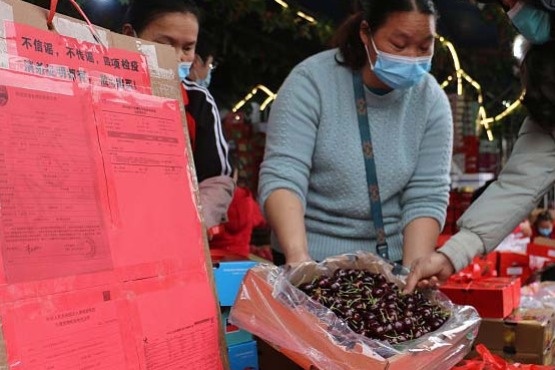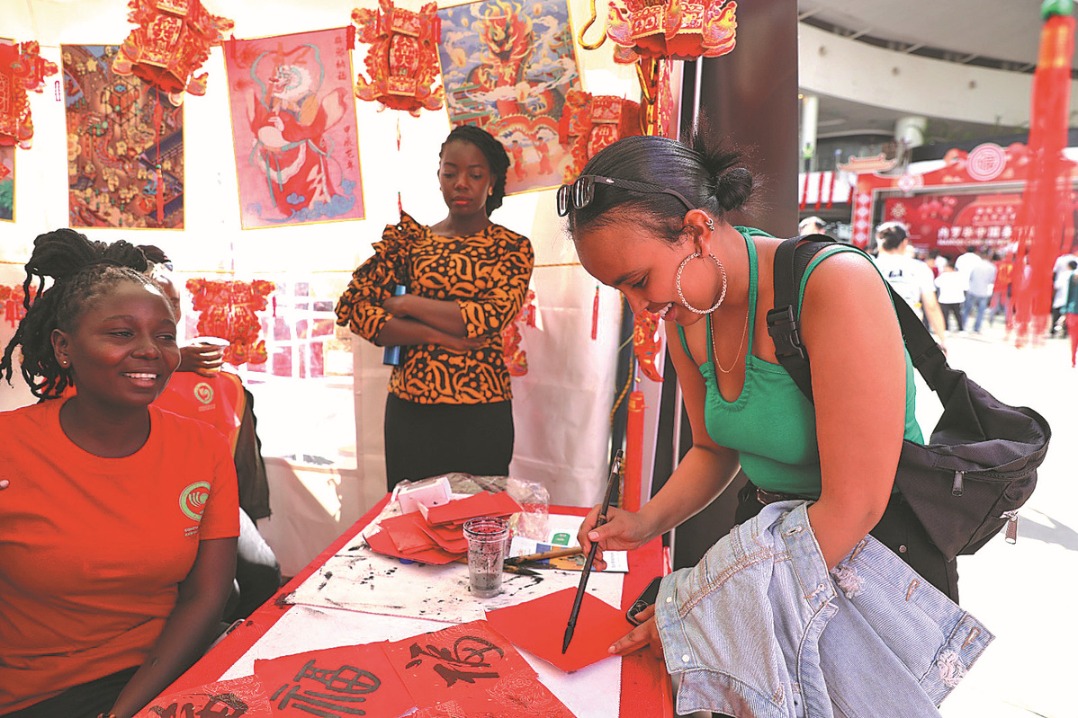Fake imported labels damaging fruit market


Imagine buying what you believe to be premium imported fruits only to discover they're actually locally grown fruits with a hefty price markup. This scenario sometimes happens in fruit markets across China, where domestically grown produce often masquerade as imported, complete with misleading packaging and labels.
For instance, pears grown in Shandong province come wrapped in boxes printed with Japanese characters, South African oranges are relabeled as Australian oranges, and domestically grown grapes are sold at 10 times their normal price when they bear a foreign tag. Shockingly, these "imported fruit" labels can be purchased online for just a few fen each.
Imported fruits are marketed as "luxury products", highlighting their unique flavors, health benefits, and exotic or rare qualities. Many consumers, drawn to these supposed premium qualities, are willing to pay extra for them. But as investigations by China Central Television have revealed, much of these highly priced fruits are no different than the domestic varieties available at a fraction of the cost. The motivation behind this deception is extra profit. A mere "imported" label creates an illusion of luxurious product that unscrupulous vendors exploit to boost prices by 50-300 percent.
A deeper investigation into this counterfeit trade has uncovered troubling facts. At the wholesale and retail levels, fake labels are stuck on local fruits, transforming them into "high-end" imports almost instantly. These fraudulent tactics have become an open secret in the fruit industry, highlighting the erosion of trust, a disregard for market regulations, and the ethical decline of some vendors.
The financial lure of counterfeit "imported" fruits has led these businesses to abandon integrity, and profit by deceiving consumers who pay a premium for what they believe to be superior, foreign produce.
The shocking ease and low cost of this fraud raise serious concerns. A mere two or three fen can buy a fake "imported" sticker, creating a lucrative market for unscrupulous traders who operate with near impunity. Despite laws governing labeling and brand authenticity, enforcement has been lax. Printing companies mass-produce fake labels without verifying trademark permissions, and merchants knowingly buy and use them, marking up prices and ignoring legal boundaries.
The greed for profit has led to a decline in both business ethics and legal compliance, a trend that threatens the credibility of the market as a whole.
Beyond the economic deception, these fruits labeled with "imported" tags raise broader issues. While there may not be immediate health risks, the practice infringes on consumer rights, destabilizes prices and cultivates a culture of deception. To protect both consumers and the market, the authorities have to end this "open secret" practice. Stronger legal action against trademark violations is essential, so is regular monitoring of the market.
Regulatory authorities should introduce stringent inspection protocols for the fruit market, conduct regular as well as sudden checks to identify and penalize those engaged in such dishonest practices. Also, publicizing exemplary penalties for offenders can serve as a strong deterrent.
Moreover, educating consumers on how to recognize authentic products and assert their rights would help curb the problem. Informed and vigilant consumers are less susceptible to fall for such tricks and can help foster a fair and transparent market environment.
Addressing the issue at its root would also involve promoting genuine domestic brands and reducing the undue emphasis on imported products. By enhancing the branding of local produce and maintaining quality, the authorities can shift consumers' focus toward actual fruit quality rather than its supposed origin. If customers can trust the excellence of domestic products, the market for counterfeit imports would naturally decline.
The growing fraud in the fruit market highlights the gaps in regulation, ethics and consumer protection that need urgent redressal. Only through robust enforcement, education, and a shift in consumers' attitude can we hope to close this chapter on faux imported "imported" fruits. Better protecting consumers, restoring trust, and upholding the integrity of the fruit market are responsibilities that must be met to sustain a fair, transparent and credible marketplace.
The author is a writer with China Daily.
yaoyuxin@chinadaily.com.cn


































